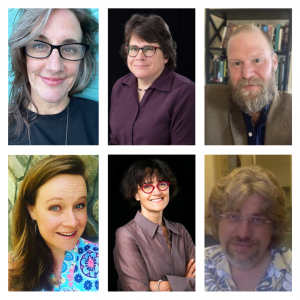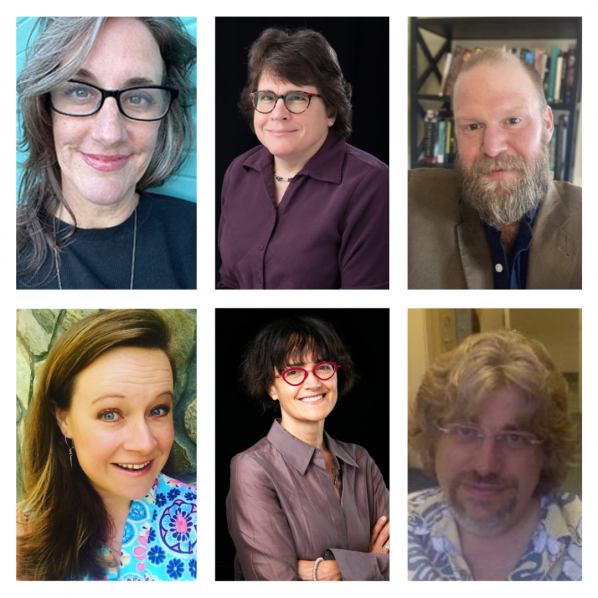BOONE, N.C. — Appalachian State University's Center for Excellence in Teaching and Learning for Student Success (CETLSS), in collaboration with faculty members from the College of Arts and Sciences, held its first of four workshops on artificial intelligence (AI). The workshop series, titled "AI at App," features brief presentations and lively discussion among App State faculty and staff on the pedagogical opportunities and challenges of AI tools in higher education. It addresses popular tools like WebGPT, ChatGPT, DALL-E and GPT-3.
The first session of the series, "Teaching the AI Empowered Student: Opportunities and Challenges," took place in the Plemmons Student Union on Friday, January 27. It was moderated by Dr. Maria Pramaggiore, chair of App State's Department of Interdisciplinary Studies, and featured the following panelists:
Rachel Clark, interim team lead for CETLSS and instructional design specialist for the College of Arts and Sciences
Dr. Beth Davison, professor in the Department of Interdisciplinary Studies
Benjamin Good, senior lecturer in the Department of English
Dr. Lindsay Masland, associate professor in the Department of Psychology and interim lead for transformative teaching and learning for CETLSS
Dr. Randall Reed, professor in the Department of Philosophy and Religion
Pramaggiore began the session by introducing the panelists and noting the recent explosion of AI in the press. In January, three artists - Sarah Andersen, Kelly McKernan and Karla Ortiz - filed a lawsuit against AI generators Midjourney, Stability AI and DeviantArt for violating copyright laws by using the artists' work to train AI tools. Similarly, Getty Images recently filed a lawsuit against Stability AI for unlawfully copying and processing millions of copyright-protected images from the Getty Images website.
Masland opened the session by presenting three options to educators: they can ignore AI, strongly or mildly discourage its use in classes, or find ways to put it to work for students, who will likely be expected to engage with AI tools in their careers in a variety of ways.
Good offered an approach that utilizes AI tools to support student writing by emphasizing the intrinsic motivations for learning how to write. Students are encouraged to use AI tools to develop research questions, summarize information and brainstorm while monitoring for bias and inaccuracies.
Davison, who is also the co-director of University Documentary Film Services, argued that new visual tools such as DALL-E may seem disruptive, but join a tradition of increasingly accessible image-making technologies, from Microsoft PowerPoint to Adobe Illustrator. According to Davison, these AI tools have immense potential for creative applications. However, anomalies do arise from these early versions of the platforms, such as images where people have three hands.
Reed uses AI extensively in research and teaching, positioning AI tools as "study buddies" who can ingest information from his lectures and field questions from students, helping them hone their critical thinking skills. He also shared his "Digital Jesus" project, an interactive AI tool based on the four gospels.
To conclude the session, Clark presented the many useful resources available from CETLSS, including an App State learning community for online teaching and links to recent publications and policies developed in response to AI at other universities.
The next session, "Everything You Always Wanted to Know About AI," is scheduled for Friday, February 17. It will draw on the expertise of faculty members from the departments of Computer Science, Curriculum and Instruction, English, Interdisciplinary Studies and Sociology to briefly cover the history of AI and to explore philosophical and theoretical approaches, including but not limited to educational applications.
During the "Exploring AI in Research and Creative Projects" session on Friday, March 10, faculty, staff and students will discuss and demonstrate the ways they are using AI in their research and creative endeavors.
The series will wrap up on Friday, April 21, with "AI Unplugged." Organizers invite faculty, staff and students to bring work in progress, successes and failures in research, teaching or creative projects. For more information, contact Dr. Susan Colby, interim executive director of CETLSS, at colbysa@appstate.edu.
The sessions are open to App State faculty, staff and students. To register, visit workshops.appstate.edu/course/info/cetlss-ai-at-app-series.
###
About the Center for Excellence in Teaching and Learning for Student Success
Appalachian State University’s Center for Excellence in Teaching and Learning for Student Success (formerly known as the Center for Academic Excellence) is dedicated to growing excellence in teaching and learning, online instruction, and mentoring and career support. The center provides professional development to the campus community — in the form of workshops, courses, learning communities, mentoring programs and resources covering a variety of topics — to advance faculty and student success. Learn more at https://cetlss.appstate.edu.
About the Department of Interdisciplinary Studies
The Department of Interdisciplinary Studies offers graduate and undergraduate degrees in four program areas: Appalachian studies; gender, women’s and sexuality studies; global studies; and interdisciplinary studies. The department is also home to Watauga Residential College, an interdisciplinary, alternative general education program. The department promotes creative and imaginative engagement through a cross-disciplinary investigation of complex systems and problems. Learn more at https://interdisciplinary.appstate.edu.
About the Department of English
The Department of English at Appalachian State University is committed to outstanding work in the classroom, the support and mentorship of students, and a dynamic engagement with culture, history, language, theory and literature. The department offers master’s degrees in English and rhetoric and composition, as well as undergraduate degrees in literary studies, film studies, creative writing, professional writing and English education. Learn more at https://english.appstate.edu.
About the Dr. Wiley F. Smith Department of Psychology
Appalachian’s Dr. Wiley F. Smith Department of Psychology serves more than 1,000 undergraduate majors seeking the Bachelor of Arts or Bachelor of Science degree in psychology, as well as 80 graduate students in three master’s programs (experimental psychology, school psychology, and industrial-organizational psychology and human resource management) and the clinical psychology (Psy.D.) doctoral program. Learn more at https://psych.appstate.edu.
About the Department of Philosophy and Religion
The Department of Philosophy and Religion invites students to explore the world, examine beliefs, understand a diversity of worldviews, and challenge the ideas and values that instruct our lives. The department offers a Bachelor of Arts in philosophy and a Bachelor of Arts in religious studies, as well as a minor in both of these areas. Learn more at https://philrel.appstate.edu.
Written by Lauren Andersen and Dr. Maria Pramaggiore
February 10, 2023
BOONE, N.C.

